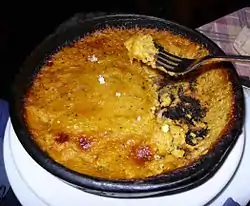Pastel de choclo
Pastel de choclo ('corn pie') is a South American dish based on sweetcorn or choclo. It is also similar to pastel de elote, found in Mexican cuisine, and to the English corn pudding. The filling usually contains ground beef, chicken, raisins, black olives, onions or slices of hard boiled egg.[1]
 Pastel de choclo for individual portions | |
| Type | Pie |
|---|---|
| Course | Main |
| Region or state | South America |
| Main ingredients | Crust: Mashed sweet corn, Filling: ground beef, chicken, raisins, black olives, onions or slices of hard boiled egg |
Preparation
The dish is prepared with sweetcorn ground into a paste. It is then seasoned with ground basil that is blended into the corn. The mixture is pre-cooked with milk and a little lard and used as a topping for the filling. The filling, known as “pino”, contains minced beef cooked with onions, paprika, other spices, and sometimes chicken, is also used as a filling for traditional Chilean empanadas.[2] The pino is laid in the bottom of the paila with slices of hard boiled egg, olives and raisins.
In popular culture
The Argentinian poet Florencio Escardó wrote the following ode to pastel de choclo, published in 1876:[3]
Y ya lo creo!
¿Habrá cosa mas rica que una humita en chala?
¿Qué les parece á ustedes una mazamorra con leche que haya sido traída desde cinco leguas en el tarro, del lechero?
Y díganme con franqueza, ¿hay cosa mas deliciosa que un pastel de choclo?
¡Si es cuento largo el enumerar las cosas ricas que se hacen con el maiz!And indeed!
Is there anything tastier than an humita in a corn husk?
How about a porridge with milk brought from five leagues away, in the milkman's jug?
And tell me, truly, is there anything more delicious than a pastel de choclo?
It's a long list, counting up the tasty treats you can make from corn!
See also
References
- Albala Ken. 'Food Cultures of the World.' ABC-CLIO Vol. I, pp. 69-70.
- Chilean Empanadas - Empanadas de Pino aboutchile.com Marian Blazes Retrieved March 17, 2013
- Escardó, Florencio "Reseña histórica, estadística y descriptiva con tradiciones orales de las Republicas Argentina y Oriental del Uruguay." La Tribuna, Montevideo, 1876. p. 129.